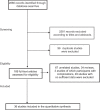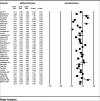Prevalence of sleep disorder in irritable bowel syndrome: A systematic review with meta-analysis
- PMID: 29652034
- PMCID: PMC5985632
- DOI: 10.4103/sjg.SJG_603_17
Prevalence of sleep disorder in irritable bowel syndrome: A systematic review with meta-analysis
Abstract
Background/aims: We conducted this meta-analysis to evaluate the prevalence of sleep disorder in irritable bowel syndrome (IBS) patients and study the association between IBS and sleep disorder.
Materials and methods: A systematic search was conducted by searching PubMed, Embase, and Cochrane library databases using the following search terms: "functional gastrointestinal disorders," "Sleep disturbance," "Sleep disorder," "insomnia," "Dysomnias," "irritable bowel syndrome," and "IBS." Studies evaluating the association between IBS and sleep disorder were identified. Data analysis was conducted using meta-analysis software Comprehensive Meta-Analysis (CMA) 2.0. Heterogeneity across studies was evaluated by χ2and I2statistics. Publication bias was evaluated by funnel plot, Begg's test, and Egger's test. Sensitivity analysis was also performed by removing each single study separately.
Results: The bibliographical search yielded a total of 2866 studies. Finally, 36 studies including 63620 participants were identified. The prevalence of sleep disorder in IBS was 37.6% (95% CI: 31.4% to 44.3%) based on this meta-analysis. The pooled odds ratio was 2.618 (95% CI: 2.052% to 3.341). Publication bias was not determined. Regarding the sensitivity analysis, the outcome was stable regardless of which study was removed.
Conclusions: The prevalence of sleep disorder was higher in IBS compared to healthy controls and may be associated with the pathogenesis of IBS. The prevalence of sleep disorder in IBS may differ according to different areas, age, gender, occupation, and IBS diagnostic criteria. Further studies are needed to investigate any possible causal relationship between sleep disorder and IBS.
Keywords: Irritable bowel syndrome; meta-analysis; prevalence; sleep disorder.
Conflict of interest statement
There are no conflicts of interest
Figures
Similar articles
-
Helicobacterpylori Infection-A Risk Factor for Irritable Bowel Syndrome? An Updated Systematic Review and Meta-Analysis.Medicina (Kaunas). 2022 Aug 2;58(8):1035. doi: 10.3390/medicina58081035. Medicina (Kaunas). 2022. PMID: 36013502 Free PMC article.
-
Physical activity for treatment of irritable bowel syndrome.Cochrane Database Syst Rev. 2022 Jun 29;6(6):CD011497. doi: 10.1002/14651858.CD011497.pub2. Cochrane Database Syst Rev. 2022. PMID: 35766861 Free PMC article.
-
Tegaserod for the treatment of irritable bowel syndrome and chronic constipation.Cochrane Database Syst Rev. 2007 Oct 17;(4):CD003960. doi: 10.1002/14651858.CD003960.pub3. Cochrane Database Syst Rev. 2007. PMID: 17943807
-
Smoking in Irritable Bowel Syndrome: A Systematic Review.J Dual Diagn. 2017 Jul-Sep;13(3):184-200. doi: 10.1080/15504263.2017.1322226. Epub 2017 Jun 13. J Dual Diagn. 2017. PMID: 28609199
-
Tegaserod for the treatment of irritable bowel syndrome.Cochrane Database Syst Rev. 2004;(1):CD003960. doi: 10.1002/14651858.CD003960.pub2. Cochrane Database Syst Rev. 2004. Update in: Cochrane Database Syst Rev. 2007 Oct 17;(4):CD003960. doi: 10.1002/14651858.CD003960.pub3. PMID: 14974049 Updated.
Cited by
-
Association Between Gastrointestinal and Sleep Problems in the General Population of Japan: A Cross-Sectional Community-Based Observational Study.Cureus. 2024 Jul 24;16(7):e65311. doi: 10.7759/cureus.65311. eCollection 2024 Jul. Cureus. 2024. PMID: 39071077 Free PMC article.
-
Systematic review and meta-analysis of sleep quality in inactive inflammatory bowel disease.JGH Open. 2022 Sep 29;6(11):738-744. doi: 10.1002/jgh3.12817. eCollection 2022 Nov. JGH Open. 2022. PMID: 36406652 Free PMC article. Review.
-
The association between meal and snack frequency and irritable bowel syndrome.Public Health Nutr. 2021 Sep;24(13):4144-4155. doi: 10.1017/S1368980020002967. Epub 2020 Sep 4. Public Health Nutr. 2021. PMID: 32883400 Free PMC article.
-
Gut Microbiome-Brain Alliance: A Landscape View into Mental and Gastrointestinal Health and Disorders.ACS Chem Neurosci. 2023 May 17;14(10):1717-1763. doi: 10.1021/acschemneuro.3c00127. Epub 2023 May 8. ACS Chem Neurosci. 2023. PMID: 37156006 Free PMC article. Review.
-
Assessment of Self-Reported Executive Function in Patients with Irritable Bowel Syndrome Using a Machine-Learning Framework.J Clin Med. 2023 May 31;12(11):3771. doi: 10.3390/jcm12113771. J Clin Med. 2023. PMID: 37297966 Free PMC article.
References
-
- Colten HR, Bruce M. Sleep Disorders and Sleep Deprivation: An Unmet Public Health Problem. Washington (DC): National Academies Press (US); 2006. - PubMed
-
- Kushida CA, Chang A, Gadkary C, Guilleminault C, Carrillo O, Dement WC. Comparison of actigraphic, polysomnographic, and subjective assessment of sleep parameters in sleep-disordered patients. Sleep Med. 2001;2:389–96. - PubMed
-
- Zhang B, Wing YK. Sex differences in insomnia: A meta-analysis. Sleep. 2006;29:85–93. - PubMed
Publication types
MeSH terms
LinkOut - more resources
Full Text Sources
Other Literature Sources
Medical





